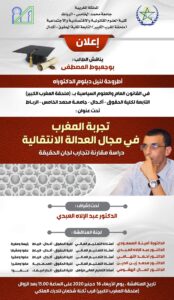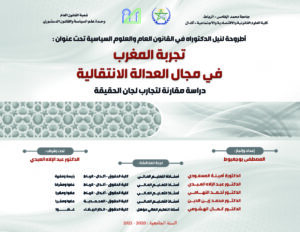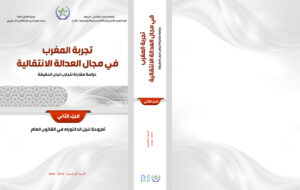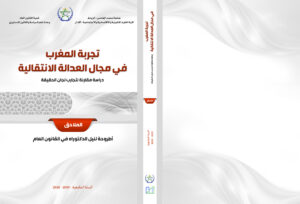أطروحة الدكتوراه: تجربة المغرب في مجال العدالة الانتقالية :دراسة مقارنة لتجارب لجان الحقيقة
أطروحة الدكتوراه: تجربة المغرب في مجال العدالة الانتقالية :دراسة مقارنة لتجارب لجان الحقيقة
Morocco’s experience in the field of transitional justice: a comparative study of the experiences of truth commissions
المصطفى بوجعبوط
كلية الحقوق – أكدال – الرباط
تم مناقشة الأطروحة بتاريخ 16 دجنبر 2020
ملخص :
يشكل الحديث عن العدالة الانتقالية أبرز الموضوعات الحديثة لفهم مسار الديمقراطيات و تقييم راهنية ومستقبل الأمم السائرة في طريق الانتقال الديمقراطي السليم، الشيء الذي جعل من هذه المرحلة ثابتا عند جميع الدول التي عرفت صراعات وحروبا أهلية وديكتاتوريات وأنظمة عسكرية، و تملك ارادة سياسية للمصالحة مع ذاتها ومع المجتمع.
في طريق الانتقال الديمقراطي السليم، الشيء الذي جعل من هذه المرحلة ثابتا عند جميع الدول التي عرفت صراعات وحروبا أهلية وديكتاتوريات وأنظمة عسكرية، و تملك ارادة سياسية للمصالحة مع ذاتها ومع المجتمع.
وعليه تم تقديم تجارب لجان الحقيقة من مختلف القارات من إفريقيا (سيراليون، جنوب أفريقيا) وأمريكا اللاتينية (الشيلي، البيرو، الأرجنتين) وأمريكا الوسطى (غواتيمالا) وآسيا (تيمور الشرقية) التي عرفت تطبيقا لمبادئ وآليات العدالة الانتقالية. ومقارنتها بالتجربة المغربية التي قاربت ملف الانتهاكات الجسيمة لحقوق الإنسان كمدخل للعدالة الانتقالية والقطع مع فظائع الماضي.
فموضوع الدراسة وبعد مرور مسافة زمنية من تأسيس هيأة الإنصاف والمصالحة، يفترض المزيد من الاهتمام والدراسة وتتبع مظاهر القوة ومكامن الضعف التي همت التجربة الموصوفة بالرائدة على مستوى شمال أفريقيا والشرق الأوسط.
وترتيبا على ما سبق، فإن الدراسة ركزت على الهندسة التنظيمية للجان الحقيقة من خلال رموزها وفاعليها ومناهج عملها وآلياتها على مستوى الاجراءات الرمزية (المصالحة الوطنية، الاعتذار، التذكارات…)، و المادية (التعويض الجماعي، والفردي)، وآليات التشاور الوطني مع مختلف الفاعلين المحليين والدوليين ومدى اعتماد مقاربة النوع الاجتماعي في لجان الحقيقة .
وخلصت هذه الدراسة إلى أهمية تجارب لجان الحقيقة وادوارها على مستوى تقليص مظالم الماضي وتفكيك السلطويات وتجاوز ما كابدته المجتمعات من صروف الظلم والانتهاكات، كما فتحت نهج للانتقالات الديمقراطية وترسيخ قيم المصالحة والوحدة الوطنية .
كلمات المفاتيح: الانتهاكات الجسيمة لحقوق الإنسان، التعذيب، الحروب الأهلية، الانقلابات العسكرية، العدالة الانتقالية، الأنظمة التصالحية، الأنظمة العقابية، لجان الحقيقة، الأنظمة السلطوية، المصالحة الوطنية.
Morocco’s experience in the field of transitional justice: a comparative study of the experiences of truth commissions
Summary :
Talking about transitional justice is the most prominent modern topic for understanding the course of democracies and assessing the current and future of nations in the path of a sound democratic transition, something that has made this stage stable for all countries that have known conflicts, civil wars, dictatorships and military systems, and have a political will to reconcile with themselves and with the society.
Accordingly, the experiences of truth commissions were presented from different continents from Africa (Sierra Leone, South Africa), Latin America (Chile, Peru, Argentina), Central America (Guatemala) and Asia (East Timor), which were known to apply the principles and mechanisms of transitional justice. And its comparison with the Moroccan experience, which approached the file of grave violations of human rights as an introduction to transitional justice and severing with the horrors of the past.
The subject of the study, and after a time has passed after the founding of the Equity and Reconciliation Commission, more attention and study are assumed, and it tracks the strengths and weaknesses that have affected the experience described as a pioneer in North Africa and the Middle East.
As a consequence of the above, the study focused on the organizational engineering of the truth commissions through their symbols, actors, work methods and mechanisms at the level of symbolic procedures (national reconciliation, apology, memorabilia …), materialism (collective compensation, individual), and mechanisms of national consultation with various Domestic and international actors and the extent to which the gender approach has been adopted in truth commissions.
This study concluded the importance of the experiences of the truth commissions and their roles on reducing the grievances of the past and dismantling the authorities and transcending the injustices and violations incurred by societies, as well as opening an approach to democratic transfers and consolidating the values of reconciliation and national unity.
Key words: gross violations of human rights, torture, civil wars, military coups, transitional justice, restorative regimes, punitive regimes, truth commissions, authoritarian regimes, national reconciliation.



